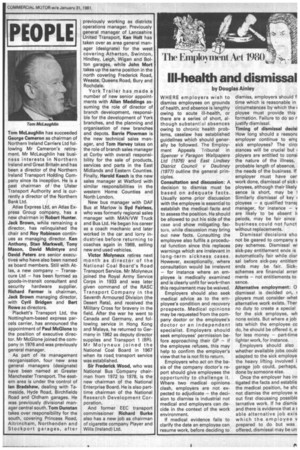Ill-health and dismissal
Page 25

If you've noticed an error in this article please click here to report it so we can fix it.
by Douglas Ainley
WHERE employers wish to dismiss employees on grounds of health, and absence is lengthy owing to acute ill-health, or there are a series of short, although substant]al absences owing to chronic health problems, caselaw has established guidelines which should generally be followed, The Employ
ment Appeals 1 ribunal in Spencer v Paragon Wallpapers Ltd (1976) and East Lindsey District Council v Daubney (1977) outline the general principles.
Consultation and discussion: A decision to dismiss must be based on adequate facts. Usually some . prior discussion with the employee is essential to establish the medical facts and to assess the position. He should be allowed to put his side of the case and show mitigating factors, while discussion may bring out new facts. Consulting the employee also fulfils a procedural function since this replaces warnings which are irrelevant in long-term sickness cases. However, exceptionally, where consultation would be irrelevnt for instance where an employee is medically examined and is clearly unfit for work-then this requirement may be waived.
Employers should also seek medical advice as to the employee's condition and recovery prospects. Medical opinions may be requested from the company doctor or the employee's doctor or an independent specialist. Employers should seek employees' permission before approaching their GP if the employee refuses, this may help to confirm the employer's view that he is not fit to return.
Employers who act on the basis of the company doctor's report should give employees the opportunity to challenge it. Where two medical opinions clash, employers are not expected to adjudicate the decision to dismiss is industrial not medical and employers can decide in the context of the work environment.
If medical evidence fails to clarify the date an employee can resume work, before deciding to
dismiss, employers should fi time which is reasonable in circumstances by which the f ployee must provide this formation. Failure to do so r justify dismissal.
Timing of dismissal decisi How long should a reason employer continue to emF sick employees? The circt stances will be crucial but players are entitled to consi the nature of the illness, probable length of absence,. the needs of the business. If employer must have cer work done, dismissal of sick i ployees, although their likely sence is short, may be Similarly dismissal of key ployees a qualified transj manager, for instance v are likely to be absent h peiods, may be fair since business could not funct without replacements.
Dismissal decisions sho not be geared to company s pay schemes. Dismissal wl sick-pay entitlement ends is automatically fair while disr sal Defore sick-pay entitlem ends may be fair. Sickschemes are financial arran ments not entitlements to sence.
Alternative employment: 0 dismissal is decided on, ployers must consider whet alternative work exists. Ther no duty to create a special for the sick employee, wh none exists. But where a job ists which the employee co do, he should be offered it, e' for less money part-time lighter work, for instance.
Employers should also whether available jobs could adapted to the sick employe the heavy lifting involved i garage job could, perhaps, done by someone else.
Once the employer has in tigated the facts and establis the medical position, he shr not dismiss the employee vs out first discussing possible ternative work. If he dismis and there is evidence that a E. able alternative job exis which the employee v prepared to do but was offered, dismissal may be un.




























































































